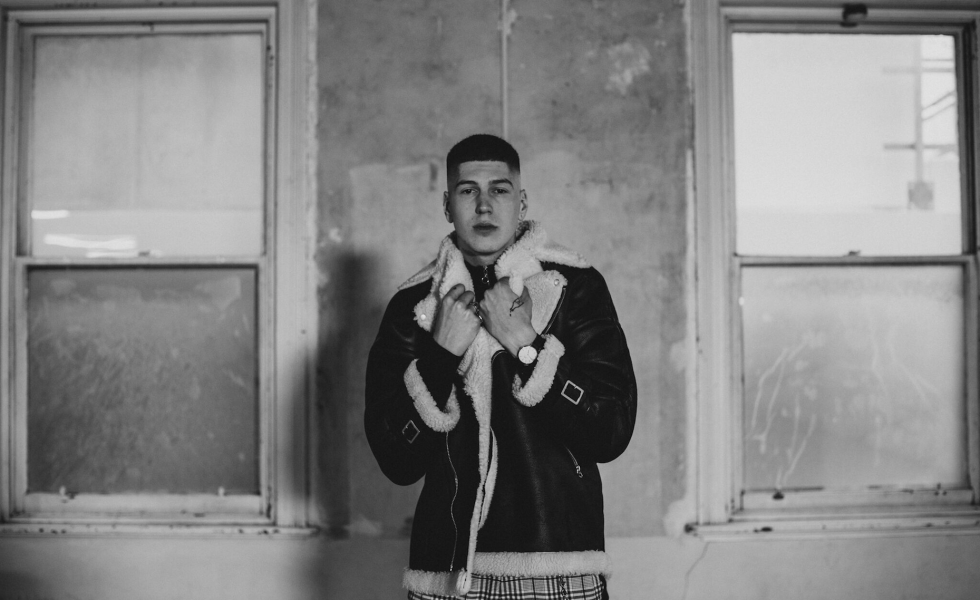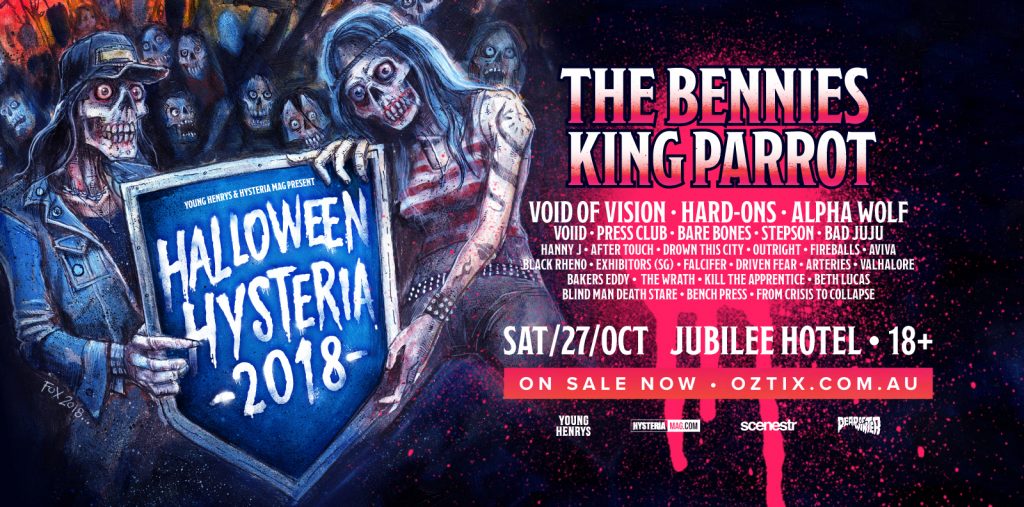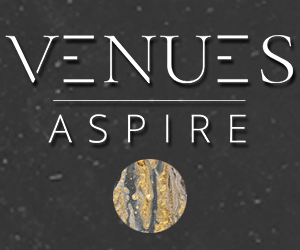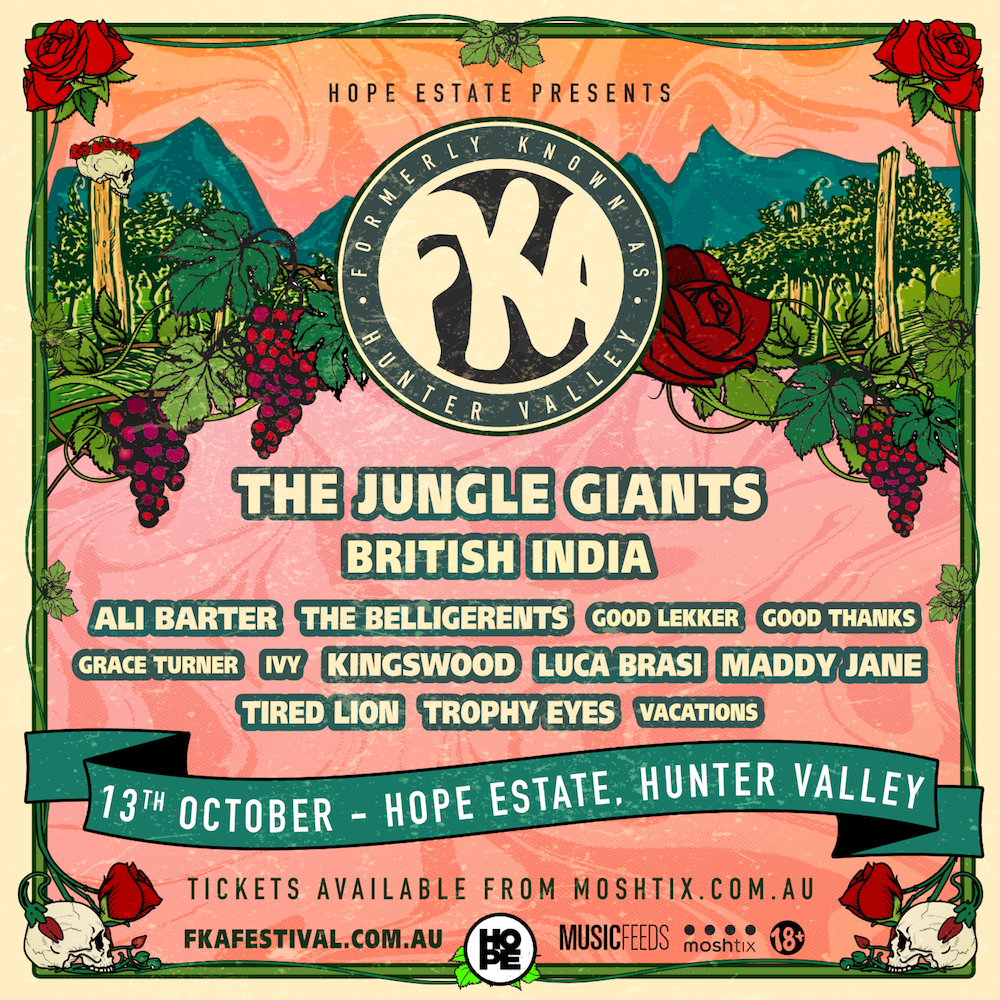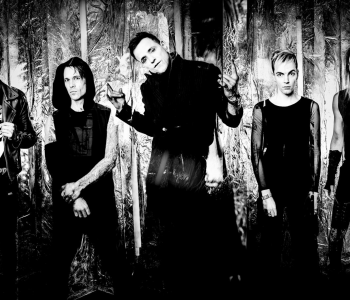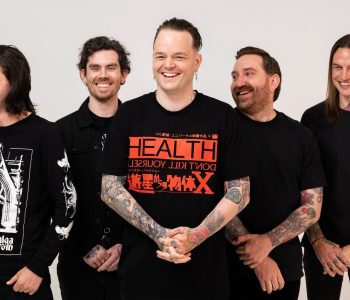Korn‘s Jonathan Davis was so excited by ORGY that he created his own record label …
If you’re reading this, there’s a solid chance you dig the new stuff from Trophy Eyes.
The American Dream—the post-tropical sadcore warriors’ third album, following their scene-defying classic, Chemical Miracle—lands today via Hopeless Records, and in the lead-up to its release, critics have been losing their bloody minds over how ambitious the LP is. We, for example, slapped it with a perfect score and said, “Thematically intense and musically monumental, The American Dream is another jaw-dropping work of art from one of the most exciting bands Australia has to offer.”
It’s not an overstatement. Across a stunningly dynamic 12 cuts, the Novocastrian quintet explore a jungle of searing post-hardcore, manic pop-rock and towering theatricality in glorious excess. It is absolutely the most daring release an Australian punk band have ever laid their name to—even if it’s probably exiled them from ‘the scene’.
Fans have noted the album’s inherent riskiness, too; hit the comment section on any of their recent social media posts, and you’ll be inundated with a flood of callous whinging over how a crop-topped John Floreani and co. (motherfucker goddamn slays in a croppy, by the way) have sold their souls to the machine, and therefore deserve nothing but the goriest of executions.
But it’s for the risks they’re taking that Trophy Eyes are where they are today—standing atop an ocean’s worth of their peers as one of the biggest bands in the country. Their forthcoming homeland tour will see them dominate theatres exceeding the 2,000-cap line, which is a far cry from the shitty PCYC halls they called home a little over two years ago. And of course the band have shed their emo roots for bouncier and more ecstatic hits—they’re not the cynical and forlorn kids they used to be.
In particular, Floreani has matured a resounding amount since their 2014 debut. The frontman has trudged through hell and high water to reach adulthood with his chin up, and though he still has plenty of demons to face off with, the 26-year-old is determined to actually do just that—face them, rather than cower and run away from them (which is, as it turns out, something he learned to do the hard way after banishing himself to Texas following the release of Chemical Miracle).
From his new home in Melbourne, a notedly chill Floreani was keen to run us through the hectic, hellish and (surprisingly) happy two years that birthed his polarising magnum opus.
So it goes without saying that we’re all completely whipped on this album. How do you think The American Dream stacks up to the rest of your discography?
I’ve gotta say, I think it is by far the best thing we’ve ever done. It’s definitely the closest I’ve ever been to being 100 percent happy with a product that I’ve made. I really think this is ‘the one’, y’know? I can listen to it front to back because I genuinely like it, and that’s crazy to me. I’ve never had that with a record of mine before.
Especially after how ambitious Chemical Miracle was, how did you want to push yourselves as songwriters with this one? Would you say The American Dream took you very far out of your comfort zone?
Not at all. I mean, it’s kind of just like a better-written Chemical Miracle, I guess. It’s not that much different from that record at all. Chemical Miracle was ambitious compared to the record before that, I’d agree there, but when that came out, we were like, “Yeah, we can write whatever the fuck we like!” It’s much more enjoyable and fun doing that, y’know? We thoroughly enjoyed doing that last record, so we thought, “Well, when we write the next one, let’s focus on things we did differently here and really like drive them, and build off those ideas—use them as a stepping stone to get better and write better music.” So that’s kind of the way that we pushed ourselves.
Just taking the next step in the evolution of Trophy Eyes.
Yeah, 100 percent! And I mean, it didn’t really feel like an evolution. I was just like, “I can’t wait to write songs again.” I started writing these songs before Chemical Miracle even came out, so it was just like that evolution never really stopped. Chemical Miracle was written and recorded, I got home and I wrote Something Bigger Than This straight away—that was the first song I wrote for this record. And that one is closer to Chemical Miracle, sure, but the songs just kept coming out and they never stopped, and I never stopped to think, “Oh, jeez, is this too much?” Or vice versa.
Did you have much of a blueprint for what you wanted to build with this album, or were you just ready to roll with the punches and let whatever felt the most natural happen?
I think it went half and half. I started writing songs out of nowhere, and they became a product of my environment. I was living in Texas for a while, and there was definitely a feeling there that I wanted to capture. But I think the first half of what I was writing didn’t really come across like that. It was more of a subconscious thing that I did, I think.
Because y’know, you can sit on a porch in Texas and smoke a cigarette in the middle of summer and there’s fireflies everywhere, it’s humid and it’s heavy, there’s country music playing somewhere and the night is just totally still. It’s just this massive vibe where time stops everything is beautiful, and I was like, “How do I take this feeling and turn it into a song?” Those moments would inspire me, and I’d run inside and start writing, and then eventually, when I started to hear what those songs sounded like, that’s when I noticed and started to develop the concept of what [The American Dream] was, and I started putting it together as a record instead of just bashing songs out, one after another.
There is definitely less fear in saying how I feel now, because it’s more about writing songs for ourselves and writing music that we like, instead of conforming to something everybody else might like.
– John Floreani
So your time living in Texas—is that where the whole ‘American dream’ idea comes from?
100 percent, yeah. I mean, the ‘American dream’ as a concept has different meanings—I’m not American so I can’t really say what it means or not—but I’ve always kind of interpreted it as a chance to start from nothing and make something out of your hard work, y’know what I mean? That’s how I’ve always seen it, and at that point in my life, I wanted to get away from here and all the big city mess I was in when I was living in Australia.
I wanted to run away and start again in some place where I didn’t have a history—where nobody knew about me and nobody knew who I was. And I’m not saying that like I’m some big rockstar—I’m saying, like, my family and my friends and the people that I knew in my communities and stuff like that. I just wanted to be totally unknown, start fresh and make a new life where nobody knew all the shitty things I’d done or the shitty person that I was. So I thought, “What the hell? I’ll run away and start again in Texas.” So that’s kind of where The American Dream as a title came from—it was the idea of running away to America, trying to start fresh and leave everything else behind.
What brought you back home?
Well, my girlfriend and I decided to move here, and I guess we were just looking for a change. I did a lot of growing up, I guess, and running away from everything I had here just didn’t seem… Like, things didn’t seem so bad here anymore. I went through a lot of personal development. And then Bianca and I decided that we wanted to be closer to our friends and my family here.
You’ve obviously never shied away from talking about some really polarising and emotional stuff in your lyrics. But on this album, I feel like you’ve written a few songs that really just lay it all out there in a way that you never have before. Did you feel a little more comfortable when it came to opening yourself up on this album?
I guess so, yeah. I kind of lost that stigma behind going, “It’s not okay to feel sad” or, “It’s not okay to be confused” and those kinds of things. When you’re growing up as a boy, you get told things like, “You better not cry because that makes you a little bitch.” And for some reason, it’s forced into your brain be like like, “Oh jeez, I don’t want to be a little bitch!” It’s such a stupid thing! And there’s also the stigma behind showing people that you’re upset. When you do that, people are kind of like, “Oh god, that guy is upset,” and especially on a public forum, you cop it a lot.
It’s quite an abrasive thing, really. If somebody is saying that in a public place and they’re like, “I don’t feel so good,” people are generally repelled by that. So this time I was like, “Y’know what? Fuck it. I don’t feel ashamed anymore. If I feel bad about something, I’m not going to be ashamed to make that known.” So that definitely made it a lot easier. There’s also a lot of pressure that lives inside these little scenes and micro-scenes, where people don’t like it if one day you sounded like something, and the next day you don’t quite sound like that anymore. They feel attacked and they get personal; they go, “Fuck you, how dare you do this to me!?”
That kind of governed how we wrote our first record, Mend, Move On, because you worry a lot about criticism when you’re a small band—you’re like, “Jesus, they’re going to hate me if I don’t play the music they like!” So especially after Chemical Miracle, going into our third record, that feeling didn’t exist anymore. We felt free to do what we liked and express ourselves in a way that we liked. There is definitely less fear in saying how I feel now, because it’s more about writing songs for ourselves and writing music that we like, instead of conforming to something everybody else might like.
It’s living proof that shit does get bearable over time and it does get better, and everything will be okay.
– John Floreani
Was this a difficult album to write as far as your own personal circumstances were concerned?
No more than any other songwriting I’ve done. For me, songwriting is such an honest and such a real place that it can be pretty emotionally draining. It’s not like you can just sit there and go, “Huh, I think I’m going to write about this today!” You have to really get into that headspace; you have to go down that track and dig that shit up, and you have to think about it and go through it all so many times, just so it makes sense in a song. You don’t just get to put it all out in a song and be done with it—you have to go deep and you have to live through that trauma all over again. And I think the writing process for anybody who writes emotional music like that is always going to be heavy, and your headspace is never really that clear.
It’s even worse if you’re going through writer’s block, too—it’s just the most self-loading, comparative shit you go through, just so you can be like, “Oh God, is what I’m doing shit? Does everybody else think this is shit!?” And you listen to all of your favourite bands, and obviously they’re amazing, so you do, “Well, why doesn’t my shit sound like that!?” It kills you when you’re trapped inside your own head. So I don’t think it’s ever really a healthy space where you go to write, but it definitely feels healthier when you come out of it.
But on the flipside, I feel like there’s a little more of an optimistic slant on this record. Y’know, it’s not strictly a dark and heart-crushing album all the way through. Was it important for you to look a little more on the bright side for some of these songs?
It’s funny—I don’t think I did that on purpose, I think that’s just naturally where I am now. I grew up a little more during the writing process for this record, and I think if you delve into the lyrics a bit, you’ll see there’s a little bit more about being happy and being with people that make me happy. You can see that in the blurb at the start of the record—that explains a little bit about where I was and how I’m now with my girlfriend who I love and who loves me, and I’m with her family and their group of friends. Things are nice right now. And I think that came across subconsciously in this way that’s like, “I’m pretty happy here, and although some of these things are shit, I’m in a good space.” It’s living proof that shit does get bearable over time and it does get better, and everything will be okay.
To me, Chemical Miracle was the kind of record I would want to listen to on a midnight road trip or when I’m wandering the streets of a city I’ve never been in. But this album gives me a completely different vibe: it’s riding in hot air balloons and driving through mountains in the early morning, watching dew trickle down the trees. It’s… I don’t know, running through fields and shit! What’s on your own mood board for this record?
That’s a cool question! I always ask people what visuals they get when they’re listening to my music, so it’s so funny you said that. To me, it sounds like… I mean, fuck, I’m having a hard time thinking of my own thing now because you’ve just nailed it—I can definitely see Friday Forever as, like, flying through the clouds and stuff. That would be sick!
I don’t know, I think the headspace I was in and the environments I was in, and those kinds of places… I see tiny little lives inside the Dallas–Fort Worth metroplex. So you’ve got these gas stations that are open 24 hours a day, and someone’s gotta work there. And you’ve got someone like a cleaner at a bar, or something like that—all these very, very human lives and lifestyles, things and environments. It’s country music in bars and green grass and white picket fences and kids playing football out the front of their houses; baseball on the weekends and things like that. There’s a lot of sunny days and pink sunsets, fireflies, crickets at night and summer rain.
So is The American Dream what’s blasting over the PA at those baseball games, or in that 24-hour gas station where someone’s trying not to fall asleep at the counter?
Definitely! Because in that area what they all listen to—and it’s good, because it’s what I listen to as well—it’s bands like U2 or songs from the ‘80s, or like all this old, Americana rock—Bruce Springsteen and stuff like that. And when I started to hear those songs and I realised that it was influencing what I was writing, I was like, “Holy shit! I want this album to sound like Trophy Eyes featuring Bruce Springsteen, or The Killers, or…” Like, I was naturally feeling those sounds and those places, and I guess that real ‘classic rock’ feeling. I wanted to take that and modernise it, and mash it up with our punk roots. The way that place looked and those people’s lives in that part of America—that’s definitely what I was I saw in my head when I was writing this record.
The album is so in-depth—it’s pretty, aggressive and dramatic all at different times, so if I’d just screamed my way through that, I feel like I would have actually wrecked the whole album.
– John Floreani
Vocally, you really put your talents on the frontline here. Was there much of a process, for you, in developing the singing style that you employ on this record?
I don’t think so. There was an in-depth thought process of just being like, “Look, I want to write a better record than we did the last time,” and with that, I needed the diversity. I was like, “I need more! I need more things,” so it became a question of, “What can we do with the production? I can add electronic stuff, I can add strings, I can add choirs, I can add more instruments and more technical riffs and things like that…” And with my voice being an instrument as well, that came naturally. I was like, “I need to do more with my voice. I can’t just scream anymore.”
Imagine if I just screamed my way through this record! The album is so in-depth—it’s pretty, aggressive and dramatic all at different times, so if I’d just screamed my way through that, I feel like I would have actually wrecked the whole album. So I thought, “I need to do this justice. I’ve gotta sing.” And I feel like I’ve always been able to sing like that, I’ve just never done it. So when everyone says things like, “You can sing now!” It’s like, well, I could always do that—I think I was just heaps more angry before [laughs].
Have you ever thought about just going totally left-field and starting a country band?
Yeah, actually! I’ve thought about it a lot! Maybe not full-on country with, like, the washboards and the slide guitars, but I’d really like to do something western—that would be cool. I really like Edward Sharpe And The Magnetic Zeros and all of that kind of stuff, so that kind of sound would be something cool to experiment with. But I don’t know. I don’t have enough time, man! I have so many projects and so many ideas that I’m kicking around with right now.
I get a really strong Gang Of Youths—or maybe The National—kind of vibe from that last track, I Can Feel It Calling. How do you feel about that link?
I mean, I love both of those bands, so I’d take it as a compliment! That’s so sweet. I think we were going for more of a Bruce Springsteen vibe on that song—that’s what I was trying to achieve personally, at least. But I mean, dude, if I got to Gang Of Youths on the scale, then that’s definitely a compliment. I’m a huge fan of them, so it’s very humbling to be compared to them.
And just to wrap it all up, what’s one interesting piece of trivia you can give us about the making of The American Dream?
Okay, so the choruses of Miming In The Choir—I was writing that at my girlfriend’s parents’ house. We were there for a few days and I had my setup with me, so I went into one of the rooms there and was just writing it onto my Mac—it’s not a crazy setup or anything, it’s just a guitar, an iRig and GarageBand. But anyway, Bianca’s little brother and sister were there—they’re 13 and ten—and I needed that backing vocal in the chorus. I wanted it to sound street-y and American-y and a bit like a kids’ choir, but with some attitude. I needed that syncopation to bounce off the main vocal and the drum beat—“All! You wanted! Was to burnout! Young!”
I needed kids’ voices for that, so I got them in there. They were trying to sing it, and I was like, “Nope, don’t sing it. I need you to like… Y’know how you sing Happy Birthday?” Not everyone can sing, but absolutely everyone in the world can sing Happy Birthday, right!? So I was like, “I need you to sing this with your Happy Birthday voice,” and somehow, it worked. I got them to kind of chant the lyrics and do this monotonous [sings Happy Birthday] kind of voice, and I was like, “Fuck! This is working! This is actually working!”
So when got to Thailand, we were working with our good friend, producer and engineer, Shane Edwards, and we were sitting there and working, and he was like, “Fuck, man, how did you get this kids’ sound?” And I told him that whole story and he was like, “Oh my God. We can’t get that here.” So I was like, “Well, maybe the band can chant it?” And he was like, “Nah, we’re just going to keep the demo track in there.” So the kids in that song are Bianca’s little brother and sister in their Happy Birthday voices, which I recorded using a Shure public speaking microphone.
The American Dream is out today via Hopeless Records.
Physical copies are available now via 24hundred, or you can jam it digitally via Bandcamp, iTunes, Google Play or Spotify.
Trophy Eyes are also touring across Australia this October. Catch them at the following dates:
Thursday 11th October // The Tivoli, Brisbane
Friday 12th October // The Enmore, Sydney
Thursday 18th October //The Gov, Adelaide
Saturday 20th October // The Forum, Melbourne
Tickets are on sale now via trophyeyesmusic.com.


